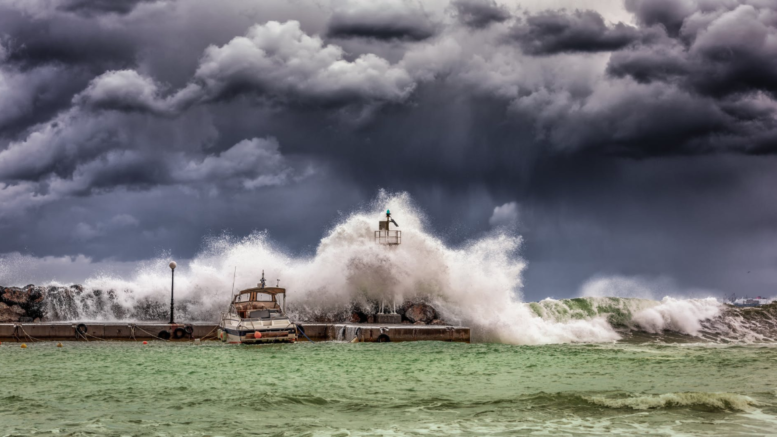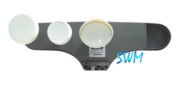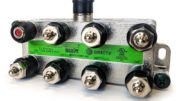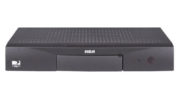Hurricanes are the natural enemy to anyone who owns a boat. Hurricane winds can get as high as 100 miles per hour or higher. That’s highly destructive to any boat that’s in or even near the water. As you know, Solid Signal has been celebrating Safe Boating Week, which kicks off on May 16, 2020. The purpose of this annual event is to encourage people to wear life jackets and to stay safe in boats. Hurricane safety tips and preparation is a natural extension of that philosophy. As you will see, these tropical storms can be hard on boats left out to absorb the damage.
The NOAA on Hurricanes
It’s very hard to be “surprised” by a hurricane these days. The National Oceanic and Atmospheric Administration (NOAA) predicts and tracks these storms in the Atlantic region. If you’re a boater who lives in hurricane-prone area, you’ll have plenty of warning from the NOAA. To help raise awareness about hurricane safety, the organization has a comprehensive, seven-part video series on YouTube. Here’s the first video in that series:
Hurricane Safety Tips for Boaters
Don’t be anywhere near your boat during a hurricane! That’s the biggest tip and it’s common sense, of course. The climate experts at the National Oceanic and Atmospheric Administration (NOAA) continue to predict active Atlantic hurricane seasons in the coming years. Therefore, boaters in hurricane-prone regions need to take steps to keep their vessels safe from harm or at least minimize potential damage and injuries. To help, we’ve put together a few important tips:
-
Move your boat if you can. A boat that’s not in the water won’t be exposed to the brutal wind and waves that are part and parcel of a hurricane.
-
If you can’t move your boat, you should at least pull it out of the water and store it somewhere safe. The farther you can get from tidal waters the better.
-
Don’t store your boat under or near trees. These could be blown over during the storm and land on your boat, damaging it.
-
Don’t forget to pull the drain plug and remove all onboard electronics before storing your boat.
-
Be sure to wrap all lines in places where they feed through chocks. Use tape, rags, rubber hoses, or leather to do this.
-
Charge your batteries and make sure they’re able to run your automatic bilge pumps during the storm.
-
If you can’t move your boat, use fenders, fender boards, or tires. It helps protect your vessel from striking against the pier, pilings, or other boats during the storm.
-
If you’re keeping your boat at a marina berth, it’s best to double the lines and rig-cross spring lines fore and aft. Attach the lines high on the pilings, too. This helps compensate for surges and the rise in the tide that comes with storms. On the offshore side, secure your boat to solid pilings with cleats and other attachment points.
-
Will your boat stay on a mooring? It’s best to make sure that mooring can withstand your vessel’s load. It’s best to contact the marina and/or mooring provider to confirm the maximum load. Also, check out the chains and swivels that connect to the mooring buoy.
The Paperwork Before the Storm
Hurricane preparation is more than just physically securing your boat. Before the storm hits, you need to have all your paperwork in order. Why? Because you might have to make an insurance claim. It won’t do you any good if you’re not prepared to do this. Here are three tips for boat owners who need to file an insurance claim due to hurricane damage:
-
Create an inventory of all the items you have on your boat. You should think about making a video or photographic record of your vessel’s contents and place that evidence in a secure location.
-
Keep all your insurance policies, boat registration, and other records in a safe place. This includes your lease agreement with the marina or storage facility.
-
Understand your lease or rental agreement with the marina or storage facility long before the hurricane arrives. It’s best to know what these places cover and what they don’t ahead of time.
One Hurricane Safety Tip for After the Storm
It’s natural to want to check for damages immediately after the hurricane hits. This isn’t the safest thing you can do, though. Hurricanes have a nasty habit of leaving downed electrical wires in their wakes. You run the risk of being shocked if you run down to the marina or shore to check on your boat. It might be best to give emergency crews a chance to do their jobs before you go check on your vessel. It’s best to contact the marina and local authorities to make sure it’s safe to inspect your boat before going out.
Safe Boating Week at Solid Signal
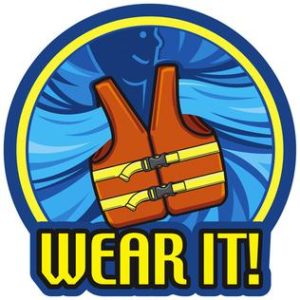
Safe Boating Week is an annual event that was created in 1958 by the United States Coast Guard. Its purpose is to promote safe and responsible boating. Here are the four biggest takeaways for any boater:
-
Always wear your life jacket. Always.
-
Have a life jacket for every passenger on your boat.
-
Insist that your passengers wear them.
-
Attach a GPS personal locator beacon to your life jackets.
There’s one more day of Safe Boating Week to come in The Solid Signal Blog. In the meantime, check out the full line of marine electronics products in our online inventory. And, if you want satellite TV on your working boat or pleasure craft, turn to our Signal Connect division. They’re always happy to discuss the benefits of satellite TV on boats and fleets. You can reach them at 888-233-7563, or by filling out the form below.

